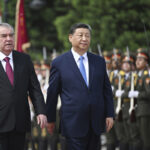In an obscure dispute between Venezuela and Guyana, its much smaller neighbour, that is provoking irresponsible talk of war, some things are clear. One is that Nicolás Maduro, Venezuela’s far-left, authoritarian president, has deliberately reignited tensions over the issue for personal political purposes.
Unpopular Maduro, who succeeded his charismatic mentor, the late revolutionary socialist Hugo Chávez, in 2013, faces an election next year that, if it is free and fair, he will likely lose. The cynical whipping up of nationalist, patriotic sentiment is a familiar refuge of rogues lacking better ways to win votes.
It also seems clear that the dispute, which centres on control of the Essequibo region in western Guyana, a sparsely populated area the size of Greece that constitutes about two-thirds of Guyanese territory, is mostly about oil. In 2015, the US oil giant, ExxonMobil, discovered a big field off Guyana’s coast, largely within its exclusive economic zone.
The discovery has swollen Guyana’s estimated oil reserves to about 11bn barrels. Venezuela has huge oil reserves, too, but mismanagement, sanctions, underinvestment and corruption have slashed production. Maduro plainly has his eyes on the lucrative ExxonMobil operation.
Nor may it be argued, despite what Maduro claims, that the legal position regarding Essequibo is unclear. The region was awarded to Guyana in 1899 after international arbitration conducted by the US, Russia and Britain, at a time when British Guiana was a colony.
As Brazil’s president, Lula, says, the last thing the world, and South America, needs right now is another war
Venezuela has always disputed this decision, claiming to be the victim of an imperial stitch-up. But it is bound by a 1966 treaty that any disagreement must be settled in a “practical, peaceful and satisfactory” way. In 2018, at Guyana’s behest, the UN referred the dispute to the international court of justice, which is reviewing it.
The lever used by Maduro to resurrect the issue as a popular cause célèbre was a referendum. Citizens were asked to unilaterally reject the ICJ process, declare Essequibo an integral part of Venezuela, and extend mandatory citizenship to its English-speaking inhabitants. The government claims the vote was overwhelmingly in favour but, as is usual in Maduro’s Venezuela, the figures were almost certainly manipulated. Armed with this bogus mandate, reminiscent of Russian tactics in eastern Ukraine, Maduro has mobilised troops and taken other threatening steps as a possible prelude to invasion and annexation.
Guyana’s president, Irfaan Ali, has appealed for help to the US, the UN and regional neighbours. In response, the Biden administration has pledged unwavering support, and US military air patrols have increased, Brazil has placed border forces on alert, and Britain, a mere spectator despite its former colonial responsibilities, declared Maduro’s provocations were “unjustified”.
It may be that this reaction is exactly what Maduro, fake champion of the masses, hoped to provoke, in order to boost his domestic standing and anti-imperialist credentials. As Brazil’s president, Luiz Inácio Lula da Silva, says, the last thing the world, and South America, needs right now is another war. Regional experts suggest the confrontation is unlikely to lead to all-out conflict, given that would probably hurt Maduro’s shaky regime. But the underlying problem remains.
This problem is not Essequibo, colonial hangovers or greed for oil. The basic problem is Maduro, whose 10-year rule lacked democratic legitimacy from the outset. He has begun ordering the arrest of opposition figures, including campaign aides to next year’s probable main election challenger, María Corina Machado, allegedly for treacherously conspiring against the Essequibo referendum.
Source : The Guardian
















